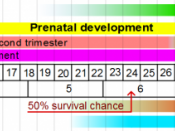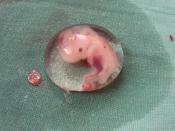To put a definition plainly, teratogens are agents responsible for many known birth defects. Research found suggests over eight hundred known teratogens. In this paper, you will find interesting facts based on research, the relationship between teratogens and developmental psychology and some personal views based on the information and research found for this piece.
Teratogens are easily classified in three different groups, these being drugs, disease and environmental. These three classifications are very broad. To be slightly more specific some commonly heard of agents classified as teratogens are given as examples. Agents classified as drugs, include prescription, non-prescription and illegal. Some frequently heard of conditions requiring prescription drugs that are known teratogens are diabetes, hypertension, and Anxiety. Other commonly heard of non-prescription and illegal teratogens are cocaine, nicotine, caffeine, and marijuana. Environmental teratogens are agents that are man made or a product of industry. Some well-known teratogens are Lead, mercury, PCB's, radiation and arsenic.
Lastly, we have teratogens due to disease. Some diseases known to cause prenatal complications are HIV, herpes, Rubella, and Syphilis. This information is very common and is all provided within the college text book and from research found by the University Hospital School of Iowa.
The affects teratogens can have on the developing fetus can vary greatly. Research provided from the University of Iowa on teratogens explains some of the possible outcome to exposure to certain teratogens. Listed birth defects resulting from exposure to teratogens, range from prenatal death, to physical and mental abnormalities.
Exposure to medications or drugs during pregnancy can result in abnormalities such as withdrawal symptom, respiratory problems, growth retardation, developmental retardation, congenital heart defects, caudal deficiency and CNS defects. Known prenatal birth defects resulting from environmental toxins such as Lead, mercury or PCB's are miscarriage, CNS damage, spasticity, mental...


